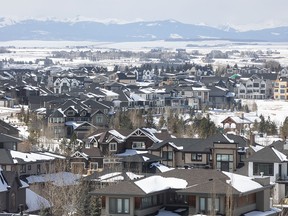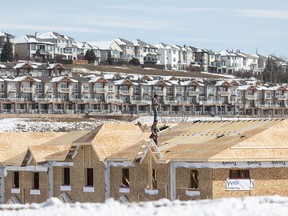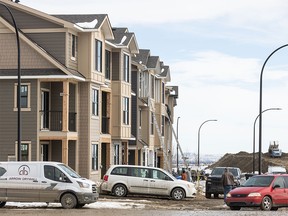
‘Unless we solve some of these challenges, we’re going to face an increasing challenge to attract talent and attract people’

Article content
Alberta is experiencing a population boom and a housing crisis, and the repercussions continue to spread across Wild Rose Country.
For Albertans looking for a place to live, it’s an anxious moment, with soaring rents, rising mortgages and higher home prices.
Article content
For businesses, it’s also a growing worry, as it will become increasingly difficult to attract or retain workers if they can’t find an affordable place to call home.
Advertisement 2
Article content
“We’re in a dire situation for housing, particularly at the lower end . . . It’s a situation of quality of life and ensuring that Calgary can be the place where everybody can live with dignity,” said Adam Legge, president of the Business Council of Alberta.
“Unless we solve some of these challenges, we’re going to face an increasing challenge to attract talent and attract people.”
In a report on housing affordability issued last week, the Royal Bank of Canada declared that “Calgary is Canada’s current hot spot.”
“This is the market where activity is still very, very robust,” Robert Hogue, RBC assistant chief economist, said Friday in an interview.
“That’s in pretty stark contrast to many markets across Canada, including those in Ontario and B.C.”
The reasons behind the trend in Calgary are well understood.
Hogue points to massive population growth that far exceeds other Canadian markets and a relatively robust economy that’s outperforming other provinces, pulling more newcomers to the city and other communities in Alberta.
As well, Calgary’s housing market is playing “catch-up” for a half-decade of weak sales and prices before the pandemic.
Article content
Advertisement 3
Article content
Data show Alberta’s population jumped by 4.4 per cent last year — increasing by more than 200,000 residents — marking the province’s highest growth rate since Pierre Trudeau was Canada’s prime minister.
In Calgary, housing sales climbed 10 per cent from levels a year earlier. The benchmark price for a Calgary home has shot up 11 per cent over the past year to nearly $600,000. The supply of homes is now less than one month.
Recommended from Editorial
Conditions in March haven’t been this tight in 18 years, said Ann-Marie Lurie, the Calgary Real Estate Board’s chief economist.
“The biggest challenge we have is that even if listings improve, sales are improving faster. There continues to be some exceptionally strong demand. Supply just can’t keep pace,” Lurie said Monday.
“You feel the impact of the growth that we’ve had over the past three or four years.”
Advertisement 4
Article content
Housing starts are rising in the city and are expected to hit new highs in 2024, although Calgary is expected to continue to experience the conditions of a sellers’ market, according to a Canada Mortgage and Housing Corp. report.
It also forecasts that the vacancy rate in the local rental market, which hovered about five per cent in 2021, will fall to just 1.1 per cent this year.
In turn, the average rent for a two-bedroom unit is anticipated to increase by 9.6 per cent from last year’s level to $1,859 a month.
That represents a $500-a-month jump since 2021.
On the homebuying front, the pressure is also growing. RBC’s housing affordability index, which looks at the share of the median household income required to cover home ownership costs, has increased to 48.3 per cent in Calgary — up 4.5 percentage points in the past year — compared with 36.8 per cent in Edmonton.
A loss of affordability “could put a damper on the recovery going forward if the worsening trend persists,” RBC’s report cautions.
“Affordability is deteriorating, like elsewhere,” Hogue said. “In fact, in Calgary, our affordability measure is at its worst point . . . in more than a decade.”
Advertisement 5
Article content

Across Canada, housing affordability has become a hot-button political issue.
For employers, housing has also become a concern.
Mogens Smed, founder of Calgary-based construction technology company Falkbuilt Ltd., worries soaring rents and housing costs will eventually price workers out of the city.
The company has grown to 550 employees since being established less than five years ago, and Smed hopes to add another 50 jobs by year’s end.
“Our factory wages, candidly, are quite high compared to anybody else. But you know what, even what we pay them in a starting wage, there’s no way they can (buy) on that number. They just can’t — the math doesn’t work. And it is a crisis,” Smed said Monday.
“We have to get creative. We got to find better ways to help the people here.”

While Alberta’s housing affordability compared with Ontario and B.C. has helped attract newcomers in the past two years, another major draw to the province is the strong employment market.
Over the past year, Alberta has created more than 80,000 jobs. As of January, there were also 71,490 job vacancies in the province, compared with 53,000 in the year before the pandemic, noted Alberta Central chief economist Charles St-Arnaud.
Advertisement 6
Article content
“No one is going to move here if they can’t find somewhere to live. Our advantage is still pretty strong compared to Vancouver or Toronto, in terms of the cost,” added Legge.
RBC notes that Calgary’s affordability index is still below the national average — and far below the levels seen in Vancouver and Toronto. It’s also slightly below levels in Ottawa and Montreal.
But the advantage is ebbing as housing prices and rents climb.
“We need affordable housing. And that’s really critical, from the perspective we need to continue to attract talent and labour and support the influx of people into the province,” said Deborah Yedlin, CEO of the Calgary Chamber of Commerce.
“Affordability is a huge worry.”
Chris Varcoe is a Calgary Herald columnist.
Article content


